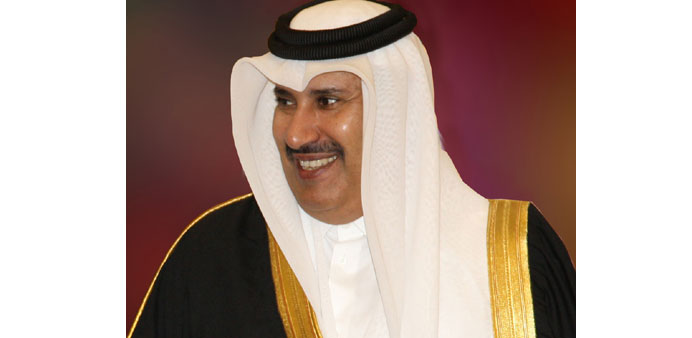QNA/Doha
|
|
HE the Prime Minister and Foreign Minister Sheikh Hamad bin Jassim bin Jabor al-Thani, the chairman of the Arab Ministerial Committee on Syria, has said Monday’s European Union decision taken to amend the arms embargo to allow “non-lethal” aid and “technical assistance” to flow to the Syrians is “inapposite”.
Responding to a question about the impact of the EU decision and the international inaction on the crisis in Syria, the Prime Minister told Al Jazeera that the Syrian people were paying the price, pointing to the fact that while the number of people killed as a result of the crisis continued to rise, the Syrian government was refusing to change its approach.
On Monday, the EU renewed sanctions against Syria for three months, keeping in place an arms embargo that applies to both the regime of President Bashar Assad and the opposition fighters.
Britain, backed by Italy and other EU allies, had recently called for the opposition fighters to be exempted from the embargo, so that European nations could arm them in their fight against Assad.
Instead, the EU’s 27 foreign ministers agreed on Monday to amend the arms embargo to provide more non-lethal support and technical assistance to protect civilians.
The Prime Minister said he was “surprised” by the European Union decision: “What do rebels want? They want things for self-defence. (For this reason) I think that this decision is inapposite and will prolong the crisis, although I am confident that the crisis will end in favour of the Syrian people.”
On the success of the initiative proposed by Moaz al-Khatib, head of the Syrian opposition coalition and the call made by the UN-Arab League envoy for Syria Lakhdar Brahimi, the Premier said: “I think we know the Syrian regime’s procrastination on such initiatives; even if it accepted them, we know that it (the Syrian regime) buys time. We support Brahimi’s efforts to find grounds for understanding between the rebels and the government, the objective of which is to implement the resolution adopted in Geneva and particularly regarding the transference of power to the people, because the people have spoken and paid a a heavy price “in blood”.
“It is a good idea but does it have a timetable? Does it have a specific system? Because the regime might accept the initiative only for the talks.”
He underlined that a strong resolution by the UN Security Council was the key to a solution.
On remarks by British Foreign Secretary William Hague on Monday in which he had announced support for al-Khatib’s initiative, the Premier said: “We are for supporting the opposition with whatever it needs, even if it (opposition) takes up arms for self-defence, as there is no clear international opinion now to end this crisis
4mn in dire need of aid, says UN
More than 4mn people inside Syria are in desperate need of aid, up sharply from 2.5mn in September, the UN said yesterday, urging a rapid political solution to the crisis that has claimed at least 70,000 lives. “We are watching a humanitarian tragedy unfold before our eyes,” Valerie Amos, the UN under-secretary-general for humanitarian affairs and emergency relief co-ordinator, told reporters in Geneva. Speaking after the seventh Syrian Humanitarian Forum bringing together different UN aid providers, she said the meeting had been heavily focused on “securing access to the millions of Syrians who desperately need help”.

